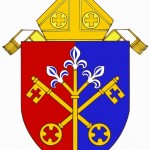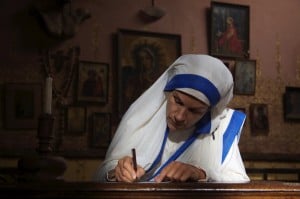Dear brothers and sisters, I am pleased to greet all the English-speaking visitors and pilgrims present, especially those here for today’s canonizations. In this Sunday’s Gospel passage, Jesus urges us to love God above all things and to love our neighbor as ourselves. Let us measure our actions every day by his call to love, and live it with courage and joy. May almighty God bless all of you!
–Pope Benedict XVI
With those words, Pope Benedict XVI greeted English pilgrims in St. Peter’s Square after the Angelus prayer on Sunday.
The Holy Father marked Mission Sunday—October 23, 2011—by canonizing three individuals whose lives had demonstrated a zeal for souls. The new saints are:
 Italian Bishop Guido Maria Conforti, the founder of the Society of St. Francis Xavier for Foreign Missions, also known as the Xaverian missionaries.
Italian Bishop Guido Maria Conforti, the founder of the Society of St. Francis Xavier for Foreign Missions, also known as the Xaverian missionaries.
Guido Conforti was born in 1865 and ordained to the priesthood in 1888; seven years later, he founded a congregation of consecrated men dedicated to the evangelization of non-Christians. He was named bishop of Ravenna in 1902, but ill health forced him to resign from the position. Five years later, his health having improved, he was returned to the episcopacy, this time as bishop of the Diocese of Parma.
He died in 1931, and was declared Blessed by Blessed John Paul II in 1996. Although Bishop Conforti’s health prevented him from becoming a foreign missionary as he would have liked, his congregation flourished; and there are today more than 1,800 Xaverian missionaries serving around the world.
 Father Luigi Guanella, founder of the Servants of Charity, the Daughters of St. Mary of Providence, and the Confraternity of St. Joseph, whose members pledge to pray for the sick and dying.
Father Luigi Guanella, founder of the Servants of Charity, the Daughters of St. Mary of Providence, and the Confraternity of St. Joseph, whose members pledge to pray for the sick and dying.
Luigi Guanella was born in 1842, the ninth of thirteen children in a poor but devout family. He entered the seminary when he was twelve years old and was ordained in 1866. From 1875 until 1878 he assisted Don Bosco in caring for homeless children.
During Luigi Guanella’s lifetime, Italy was a strongly socialist country; and the anticlerics and socialists passed legislation restricting and suppressing the activities of the church. Father Guanella was a friend of Pope Pius X, often appealing to the pope for help with his charitable endeavors.
Father Guanella traveled to the United States in 1912, concerned about the plight of the Italian immigrants. While in Chicago, he attempted to schedule a trip to Genoa, Wisconsin, to visit relatives and old friends; but his schedule did not permit it. Father Guanella died in 1915. His lifelong devotion to charity and good works was recognized by the Church, and he was beatified by Pope Paul VI on October 25, 1964.
 Bonifacia Rodriguez Castro, founder of the Congregation of the Sisters of St. Joseph. Born to a working class family in Salamanca, Spain, she went to work at the age of fifteen to help support her family.
Bonifacia Rodriguez Castro, founder of the Congregation of the Sisters of St. Joseph. Born to a working class family in Salamanca, Spain, she went to work at the age of fifteen to help support her family.
Always interested in religious life, Bonifacia had intended to become a Dominican sister. But in October 1870, she met Catalan Jesuit Francisco Javier Butiña y Hospital, whose work The Light of the Manual Worker was a collection of life stories of distinguished faithful who sanctified themselves in humble situations. Attracted by his message about the sanctity of work, Bonifacia sought his spiritual direction; and it was this priest who persuaded her to found a new congregation oriented towards the protection of the woman worker. She created the “Nazareth
workshop” to help poor unemployed women. She died in 1905 and was beatified by Pope John Paul II.











